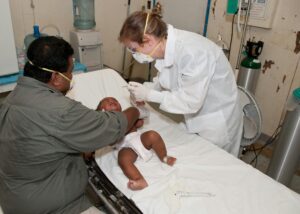CONSULTING
World Health Day: IDOM’s commitment to quality of care
APRIL 7, 2024
Victoria Martínez Seijas
Consultora Health Care | Linkedin
World Health Day is celebrated on April 7 to recognize health as a universal right and to promote access to quality health care in all regions of the world. Celebrating the 76th anniversary of the World Health Organization (WHO), this year marks the importance of the right to health for all, especially the most vulnerable.
According to the WHO, between 6 and 8.5 million people die each year in low- and middle-income countries due to poor quality health care, accounting for up to 15% of all deaths in these countries. The loss of productivity due to poor quality of care in these countries is estimated at $1.4 to $1.6 trillion per year.
A key element in achieving effective universal health coverage is the quality of health services.

Quality of care is inextricably linked to social justice, because everyone deserves access to quality health care. This is the line IDOM is committed to, knowing that quality of care is the degree to which health care services increase the likelihood of desired health outcomes.
The mission of the Joint Commission International (JCI) is to improve the safety and quality of care in the international community. To that end, JCI quality accreditation establishes standards and best practices organized into three broad areas: international patient safety goals, standards focused on patient care, and standards focused on the management of healthcare organizations. Each of these areas is unique and has its own needs, character, values, and beliefs. Therefore, healthcare organizations should work to establish open and trusting communication with patients and protect their values wherever possible.
IDOM’s commitment to Quality Care

Improving the quality of health services requires strong action at all levels, from governments to hospitals. That is why IDOM, in the field of health, has worked with the team at Cruces Hospital in Bilbao to develop programs based on continuous monitoring and supervision to ensure safe facilities and infrastructures for patients, professionals and visitors.
Similarly, improving the quality of and access to health services requires attention to knowledge generation and learning. Lessons learned on how to provide quality care must be systematically collected, documented and shared within and between countries. In this regard, IDOM conducted a project in 26 countries in Latin America and the Caribbean to assess the level of diffusion of digital tools in response to COVID in each of these countries. This allowed recommendations to be made based on the strengths and weaknesses of each territorial context.
The European Reference Networks for the Treatment of Rare or Complex Diseases (ERNs) are European structures created under the auspices of the European Commission and the governments of the Member States, whose mission is to share knowledge for the diagnosis and care of patients with rare or complex diseases. The existence of these 24 networks improves the equity of access of European patients to highly specialized quality care, linking approximately 1500 specialized care units across Europe. IDOM, in collaboration with the Andalusian Health Quality Agency, has carried out the first evaluation of the functioning of these networks and almost 900 of the clinical units that make them up.
These are some of the examples that demonstrate IDOM’s firm commitment to universal health coverage and improving the quality of care.



